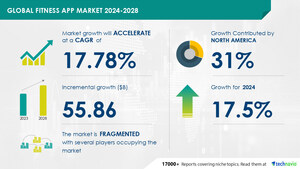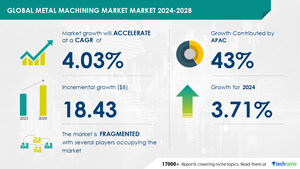NEW YORK, June 3, 2024 /PRNewswire/ -- The global trade management software market size is estimated to grow by USD 1.12 billion from 2024-2028, according to Technavio. The market is estimated to grow at a CAGR of over 10.5% during the forecast period.
For comprehensive forecast and historic data on regions, market segments, customer landscape, and companies- Click for the snapshot of this report
Trade Management Software Market Scope |
|
Report Coverage |
Details |
Base year |
2023 |
Historic period |
2018 - 2022 |
Forecast period |
2024-2028 |
Growth momentum & CAGR |
Accelerate at a CAGR of 10.5% |
Market growth 2024-2028 |
USD 1120.6 million |
Market structure |
Fragmented |
YoY growth 2022-2023 (%) |
9.6 |
Regional analysis |
North America, Europe, APAC, South America, and Middle East and Africa |
Performing market contribution |
North America at 33% |
Key countries |
US, China, Germany, Canada, and UK |
Key companies profiled |
Acme Trade Group Pty Ltd., AEB SE, Aptean Group of Companies, Bamboo Rose LLC, Cognizant Technology Solutions Corp., Descartes Systems Group Inc., E2open Parent Holdings Inc., Expeditors International of Washington Inc., Koch Industries Inc., Livingston International Inc., MIC Datenverarbeitung GmbH, Noatum Holdings SLU, OCR Services Inc., Oracle Corp., QAD Inc., S and P Global Inc., SAP SE, Thomson Reuters Corp., Trademo Technologies Inc., and United Parcel Service Inc. |
Market Driver
The global trade landscape is witnessing a surge in enterprises seeking to export their goods and services, leading to the expansion of trade management software solutions. Keywords such as e-commerce, omnichannel distribution, and emerging technologies like AI and automation are driving innovation in this sector. Vendors must keep updating their products to comply with evolving import-export regulations and cater to complex processes in various end-user industries, including aerospace and defense, consumer goods, and energy.
Cross-border transactions, customs filings, and compliance risks are impediments that effective trade management software must address. Infrastructure development and cloud adoption are crucial for efficient supply chains and digitalization in international commerce.
Market Challenges
• Trade management software market caters to organizations in trade-related sectors, including retail, transportation and logistics, and SMEs. These platforms facilitate supply chain efficiency, real-time insight, and compliance with country-specific regulatory laws. Key features include predictive analysis, resource utilization, and restricted party screening.
• Software solutions enable real-time shipment tracking, transportation management, and trade compliance. Adoption of technology, such as transportation and logistics systems, is crucial for managing worldwide shipping costs and navigating complexities like multiple languages, time zones, and currencies.
Research report provides comprehensive data on impact of trend, driver and challenges - Request a sample report!
Segment Overview
- Deployment
- 1.1 Cloud-based
- 1.2 On premise
- End-user
- 2.1 Retail and consumer goods
- 2.2 IT and telecom
- 2.3 Automotive
- 2.4 Transportation and logistics
- 2.5 Others
- Geography
- 3.1 North America
- 3.2 Europe
- 3.3 APAC
- 3.4 South America
- 3.5 Middle East and Africa
1.1 Cloud-based- Trade Management Software Market: This market encompasses cloud-based technologies and solutions designed for various End-User Industries, including Aerospace and Defense, Consumer Goods, Energy, and others. The adoption of cloud deployment in trade management software is a significant trend, driven by the need for efficient supply chain operations, digitalization, and cross-border transactions in international commerce.
AI and automation play a crucial role in streamlining complex processes, ensuring compliance with import-export legislation, and managing cargo tracking in this sector. Cloud-based software/SaaS offers numerous benefits, such as quick deployment, minimal infrastructure investment, and subscription-based payment options. However, impediments to cloud adoption include data security concerns, compliance risks, and the impact of emerging technologies like blockchain on traditional trade management systems.
The aerospace and defense industry, with its focus on complex process management and component type manufacturing, heavily relies on trade management software for efficient supply chain operations. Similarly, developing countries are increasingly adopting these solutions to streamline import-export activities and reduce inefficiencies, despite infrastructure challenges.
E-commerce and free trade zones have disrupted traditional trade models, necessitating the need for real-time, centralized information sharing from aerospace development to consumer goods manufacturing. GTM software implementation in industries like defense and energy can significantly reduce expenses related to customs filings, delivery deadlines, and import-export legislation compliance.
Despite these advantages, firms face challenges in implementing trade management software, including the need for consulting services, managing finances, and dealing with import-export legislation in various countries. The market for trade management software continues to evolve, driven by global trade volumes, international commerce, and the ongoing digitalization of various industries.
For more information on market segmentation with geographical analysis including forecast (2024-2028) and historic data (2017-2021) - Download a Sample Report
Research Analysis
The Trade Management Software market caters to businesses and organizations involved in international trade, specifically import-export activities and supply chain management. This software facilitates efficient trade compliance through features like Custom filings, Restricted party screening, and adherence to import-export legislation. Additionally, it offers services such as Vendor Management, Import/Export Management, Invoice Management, and Consulting.
The software can be deployed On-Cloud for accessibility and convenience. Key functions include Trade compliance risk management, Component tracking, and shipment tracking. Overall, Trade Management Software is an essential tool for traders and organizations seeking to streamline their import-export operations and mitigate compliance risks.
The Trade Management Software market is a critical segment in today's business landscape. This market encompasses software solutions designed to streamline and optimize various trade processes. Key components include procurement, inventory management, logistics, and supply chain operations. Consulters and analysts predict significant growth in this sector due to increasing globalization, digitalization, and the need for real-time data and analytics.
Companies are investing in advanced technologies like AI, machine learning, and IoT to enhance their trade management capabilities. The market is competitive, with major players offering comprehensive solutions to cater to diverse industry needs. The future of trade management software lies in its ability to provide end-to-end visibility, automation, and integration across the entire trade lifecycle.
Table of Contents:
1 Executive Summary
2 Market Landscape
3 Market Sizing
4 Historic Market Size
5 Five Forces Analysis
6 Market Segmentation
- Deployment
- Cloud-based
- On Premise
- End-user
- Retail And Consumer Goods
- IT And Telecom
- Automotive
- Transportation And Logistics
- Others
- Geography
- North America
- Europe
- APAC
- South America
- Middle East And Africa
7 Customer Landscape
8 Geographic Landscape
9 Drivers, Challenges, and Trends
10 Company Landscape
11 Company Analysis
12 Appendix
About Technavio
Technavio is a leading global technology research and advisory company. Their research and analysis focuses on emerging market trends and provides actionable insights to help businesses identify market opportunities and develop effective strategies to optimize their market positions.
With over 500 specialized analysts, Technavio's report library consists of more than 17,000 reports and counting, covering 800 technologies, spanning across 50 countries. Their client base consists of enterprises of all sizes, including more than 100 Fortune 500 companies. This growing client base relies on Technavio's comprehensive coverage, extensive research, and actionable market insights to identify opportunities in existing and potential markets and assess their competitive positions within changing market scenarios.
Contacts
Technavio Research
Jesse Maida
Media & Marketing Executive
US: +1 844 364 1100
UK: +44 203 893 3200
Email: [email protected]
Website: www.technavio.com/
SOURCE Technavio

WANT YOUR COMPANY'S NEWS FEATURED ON PRNEWSWIRE.COM?
Newsrooms &
Influencers
Digital Media
Outlets
Journalists
Opted In




Share this article